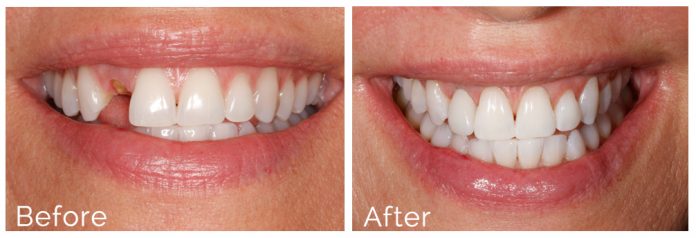Dental Implants
SERVICE OVERVIEW

Dealing with missing teeth is tough. This problem not only affects your oral and dental health — it can also have a negative impact on your self-confidence as well. If you’re tired of hiding your smile or are uncomfortable with dentures and bridges, maybe it’s time to consider getting a dental implant.
Dental implants are the closest thing you can get to a new set of natural teeth. They’re safe, easy to maintain and can potentially last a lifetime.
Here’s everything you need to know about this dental breakthrough:
What Are Dental Implants And How Do They Work?
Think of dental implants as artificial tooth roots. These titanium posts are shaped like screws and are surgically implanted into the jaw bone. They’re then used as foundations for artificial teeth.
There are two types of dental implants.The most common is the endosteal implant, where the device is surgically placed directly into the jaw bone. The second type is called subperiosteal implant, where the implant is placed on the bone just underneath the gum tissue. This type is used when the person doesn’t have enough bone height to accommodate an endosteal implant.
Titanium is used in both cases as this material naturally fuses with the bones in a process called osteointegration.
After the procedure, one usually has to allow 2-6 months for the tissues to heal and for the implants to integrate into the jaw bone. Once done, artificial teeth can then be mounted onto the implant.
Who Can Get Dental Implants?
People who have adequate bone height and structure, as well as healthy gums are the best candidates for dental implants. On the other hand, smokers and individuals with chronic illnesses are less suited for the procedure.
What Are The Advantages Of Dental Implants?
The biggest advantage of getting dental implants is that they stay securely in place. They don’t move around or slip like dentures, so you don’t have to worry about them getting dislodged when you speak or eat. They also help you chew your food better without any discomfort. Unlike bridges, dental implants don’t need adjacent teeth for support.
Another great thing about dental implants is that they allow you to have tooth replacements that look and feel like natural teeth. These replacements are impervious to cavities and tooth decay and can potentially last a lifetime given proper care and maintenance.
How Do You Care For Dental Implants?
You might have to visit your dentist for check-ups immediately after your procedure. After that, caring for your dental implants should be easy. Here are a few guidelines on how to care for them:
- Make sure to brush at least two times a day and floss regularly to keep your teeth clean and your gums healthy.
- Keep your bones strong by incorporating a healthy amount of calcium in your diet.
- Refrain from putting unnecessary pressure on your new teeth. Stay away from hard food, especially in the weeks following your procedure.
Getting a dental implant is a major step that requires a lot of serious thought and planning. Book an appointment to see if you’re a great candidate for this procedure.
